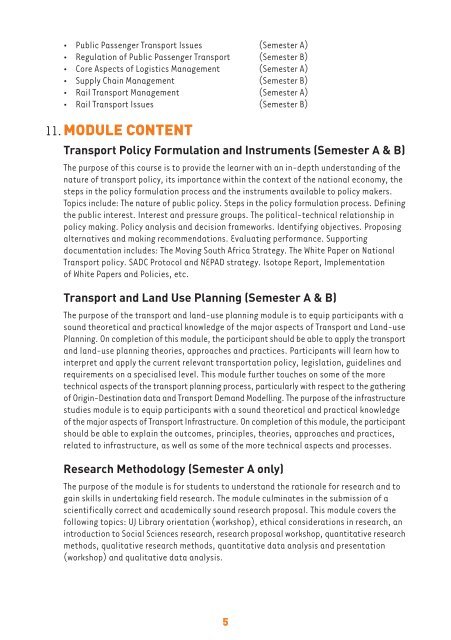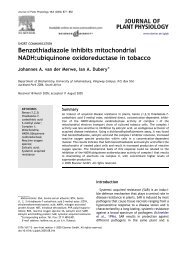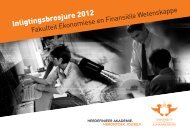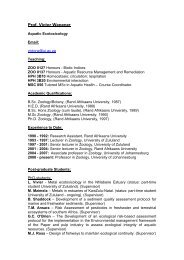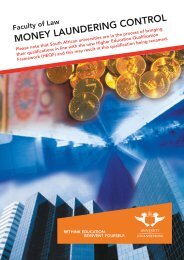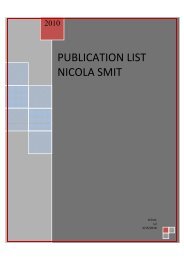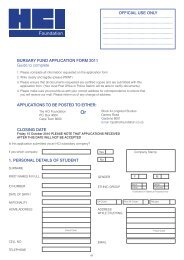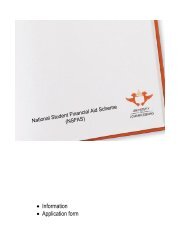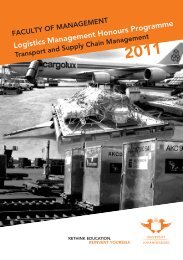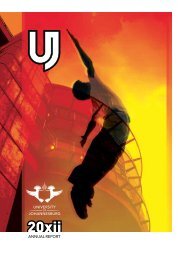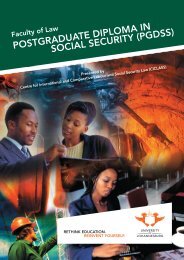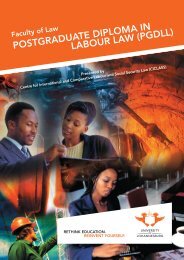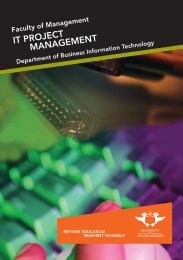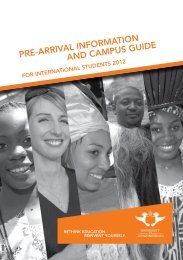Untitled - University of Johannesburg
Untitled - University of Johannesburg
Untitled - University of Johannesburg
- No tags were found...
Create successful ePaper yourself
Turn your PDF publications into a flip-book with our unique Google optimized e-Paper software.
• Public Passenger Transport Issues (Semester A)• Regulation <strong>of</strong> Public Passenger Transport (Semester B)• Core Aspects <strong>of</strong> Logistics Management (Semester A)• Supply Chain Management (Semester B)• Rail Transport Management (Semester A)• Rail Transport Issues (Semester B)11.MODULE CONTENTTransport Policy Formulation and Instruments (Semester A & B)The purpose <strong>of</strong> this course is to provide the learner with an in-depth understanding <strong>of</strong> thenature <strong>of</strong> transport policy, its importance within the context <strong>of</strong> the national economy, thesteps in the policy formulation process and the instruments available to policy makers.Topics include: The nature <strong>of</strong> public policy. Steps in the policy formulation process. Definingthe public interest. Interest and pressure groups. The political-technical relationship inpolicy making. Policy analysis and decision frameworks. Identifying objectives. Proposingalternatives and making recommendations. Evaluating performance. Supportingdocumentation includes: The Moving South Africa Strategy. The White Paper on NationalTransport policy. SADC Protocol and NEPAD strategy. Isotope Report, Implementation<strong>of</strong> White Papers and Policies, etc.Transport and Land Use Planning (Semester A & B)The purpose <strong>of</strong> the transport and land-use planning module is to equip participants with asound theoretical and practical knowledge <strong>of</strong> the major aspects <strong>of</strong> Transport and Land-usePlanning. On completion <strong>of</strong> this module, the participant should be able to apply the transportand land-use planning theories, approaches and practices. Participants will learn how tointerpret and apply the current relevant transportation policy, legislation, guidelines andrequirements on a specialised level. This module further touches on some <strong>of</strong> the moretechnical aspects <strong>of</strong> the transport planning process, particularly with respect to the gathering<strong>of</strong> Origin-Destination data and Transport Demand Modelling. The purpose <strong>of</strong> the infrastructurestudies module is to equip participants with a sound theoretical and practical knowledge<strong>of</strong> the major aspects <strong>of</strong> Transport Infrastructure. On completion <strong>of</strong> this module, the participantshould be able to explain the outcomes, principles, theories, approaches and practices,related to infrastructure, as well as some <strong>of</strong> the more technical aspects and processes.Research Methodology (Semester A only)The purpose <strong>of</strong> the module is for students to understand the rationale for research and togain skills in undertaking field research. The module culminates in the submission <strong>of</strong> ascientifically correct and academically sound research proposal. This module covers thefollowing topics: UJ Library orientation (workshop), ethical considerations in research, anintroduction to Social Sciences research, research proposal workshop, quantitative researchmethods, qualitative research methods, quantitative data analysis and presentation(workshop) and qualitative data analysis.5


